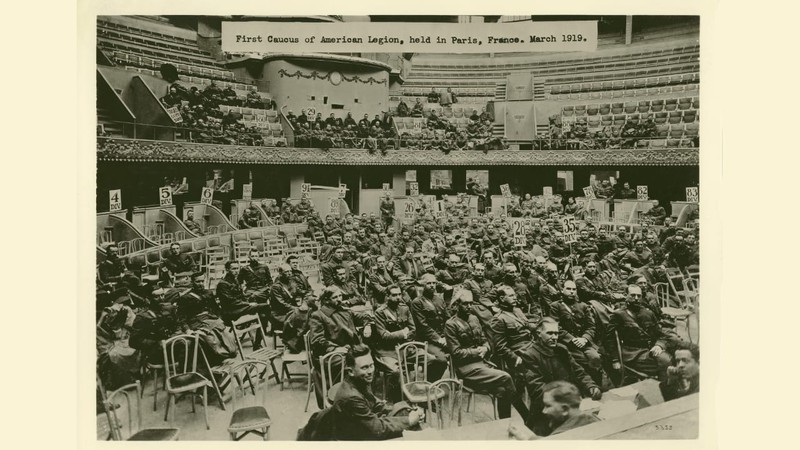The organization responsible for the GI Bill and Veterans Day continues to help service members, veterans, and their families.

Hundreds of soldiers came together in Paris in 1919 to build something bigger than the sum of its parts. Unknown Public Domain
The American Legion, formed during a crisis among members of the US armed forces, today advocates to help active service members get fair pay and adequate housing. The organization is also the largest veterans service organization in the nation, and helps vets get healthcare, work, and education.
Founding
On Nov.11, 1918, WW I officially came to an end with the signing of the armistice between the Allied and Axis powers in Compiègne, France.
With the fighting over, hundreds of thousands of soldiers in the American Expeditionary Forces (AEF) remained in Europe, impatiently waiting for transport home. Morale plummeted and concerns rose in the leadership over the deteriorating situation.
During that time, Lt. Col. Theodore Roosevelt Jr., son of Pres. Theodore Roosevelt, started having discussions with Maj. Gen.George White, who suggested the establishment of an organization for service members, following the model of the veterans organizations established at the end of the Civil War*.
Meanwhile, as discontent persisted in the ranks, Gen. John Pershing ordered a group of 20 officers selected by Roosevelt to meet with him in Paris on Feb. 15, 1919 to develop proposals to address the flagging morale. They met over three days and developed several ideas that were forwarded to headquarters and immediately implemented.
Roosevelt took the opportunity over dinner the first night to discuss establishing a service member organization with the assembled officers, who enthusiastically approved the plan. It was decided to gather representatives of the various AEF units in Europe to assemble to draft a plan for the organization. On March 15, 1919, hundreds of officers and enlisted men met for the so-called “Paris Caucus.”
Over the course of three days, the hundreds of soldiers elected a presiding chair, proposed and approved rules for the proceedings, and selected three committees of fifteen members each to decide upon a name for the group, draft a constitution for the group, and enact a structure and plan for a national convention to be held in a few months time in the United States.
It was in this breathtaking display of efficient democratic process that the American Legion was named and formed.
On September 16, 1919, the Legion was officially chartered by an act of Congress. A convention was held in the United States in November 1919, in which the provisional constitution for the organization drafted at the Paris Caucus was finalized and adopted.
(Nov. 11, 1919 is also when a group of American Legion members joined a mob that stormed an Industrial Workers of the World hall in southwestern Washington, resulting in six deaths.)
Today
The American Legion is designated as a 501(c)19 exempt organization and is headquartered in Indianapolis, Ind.. With 1.8 million members, it is the largest veteran’s service organization, with a mission based on “Four Pillars:” Veterans Affairs & Rehabilitation, National Security, Americanism, and Children & Youth.
Organization of the American Legion is distributed across a national level, regional departments and local posts, with officers elected from the membership. In addition to lobbying for veterans benefits and service at the national level, the group also advocates for “civic responsibility, national security, and the preservation of American values.”
Following WWII, American Legion advocacy is credited with passage of the original GI Bill, which provided housing, education and employment benefits to veterans of the war. It was also American Legion advocacy that led to the redesignation of what was the Armistice Day observance of the end of WW I to the Veterans Day federal holiday by Presi. Dwight D. Eisenhower in 1954 as a celebration of the service of all veterans.
Services provided by local posts help veterans “thrive in civilian life,” and include assistance in enrolling for government benefits, health care, education and employment opportunities.
Children and Youth were called out by the founding veterans of WWI, who were all too aware of the orphans left behind by war. To this day, the American Legion is active in efforts to immunize children from disease, fund scholarships, support groups such as the Boy Scouts of America and youth athletic leagues, and sponsorship of essay and oratory contests in schools.
The American Legion Auxiliary was also formed in 1919 in support of the mission of the American Legion, with a membership of male and female spouses, grandmothers, mothers, sisters, and direct and adopted female descendants of members of the American Legion.
Learn More:
* Following the Civil War, two veterans organizations were established, the Grand Army of the Republic (GAR) and the United Confederate Veterans (UCV).
Long form articles which explain how something works, or provide context or background information about a current issue or topic.